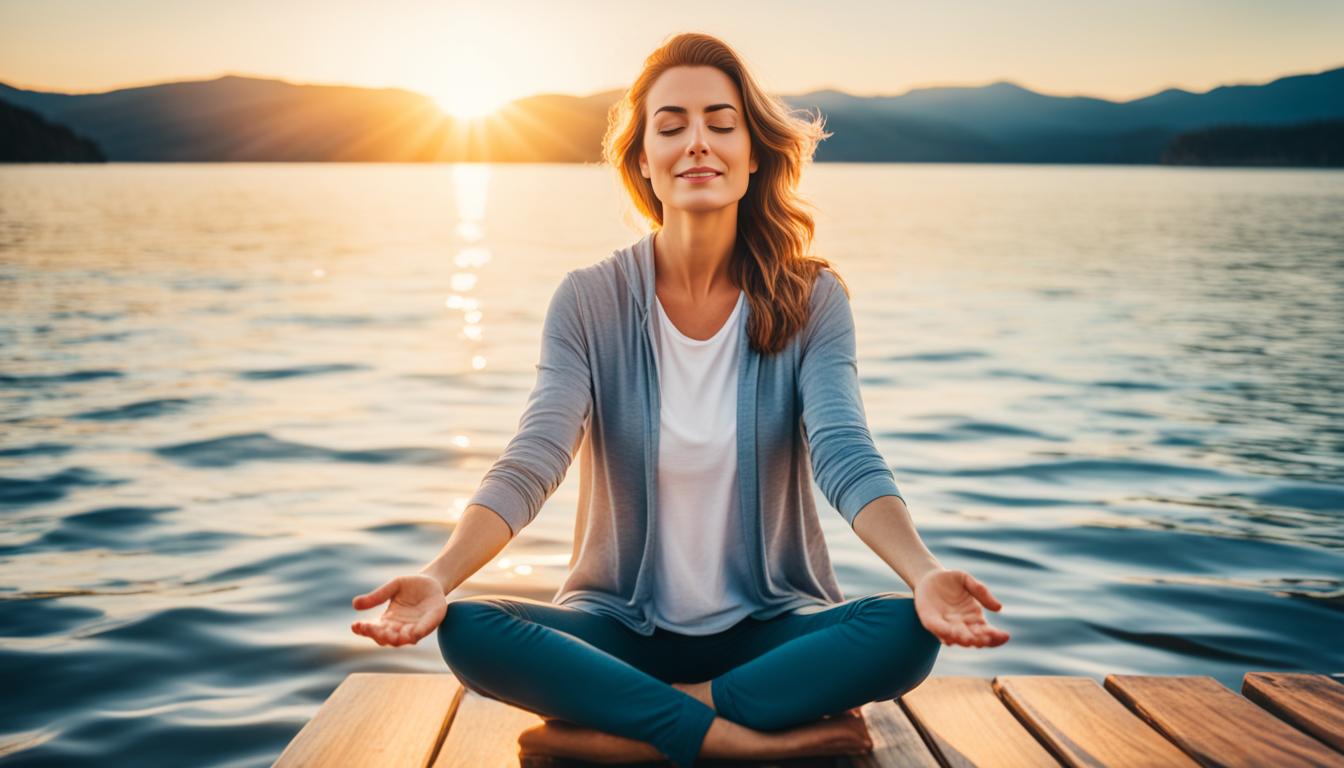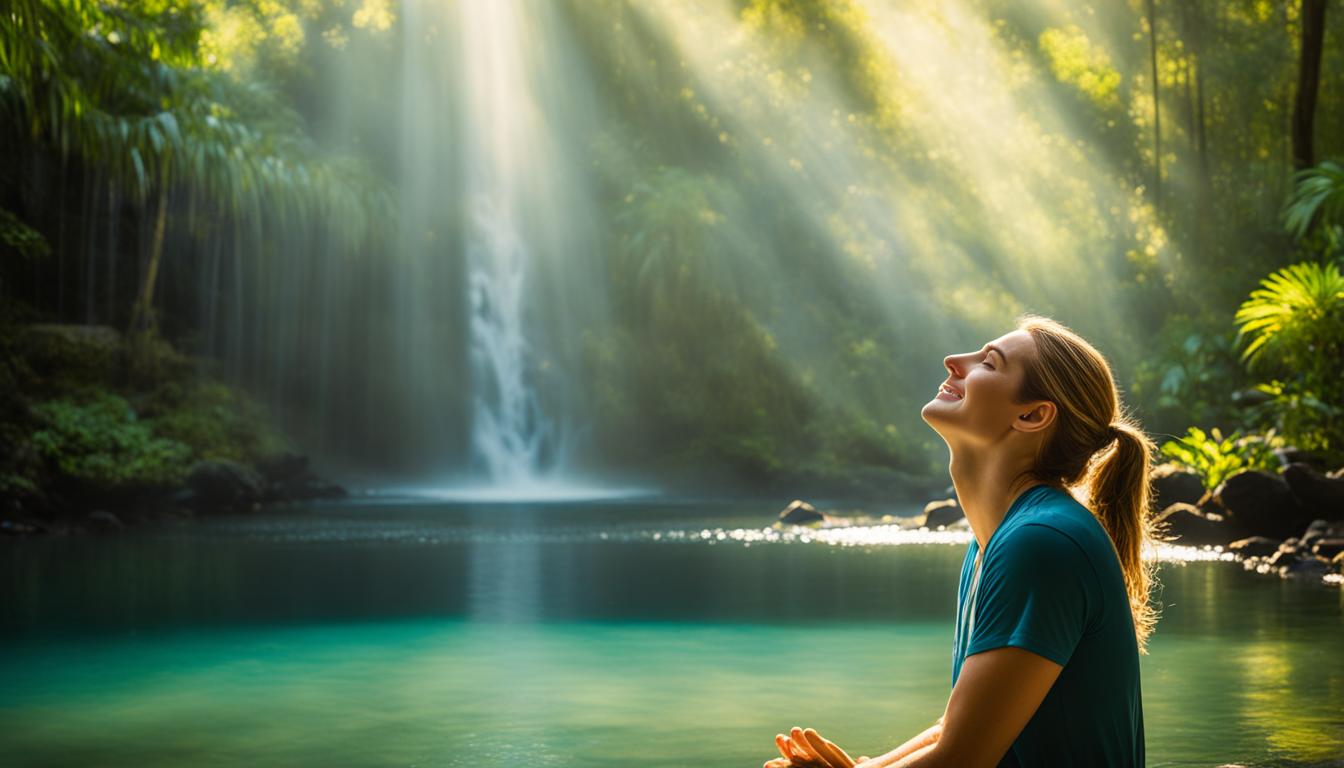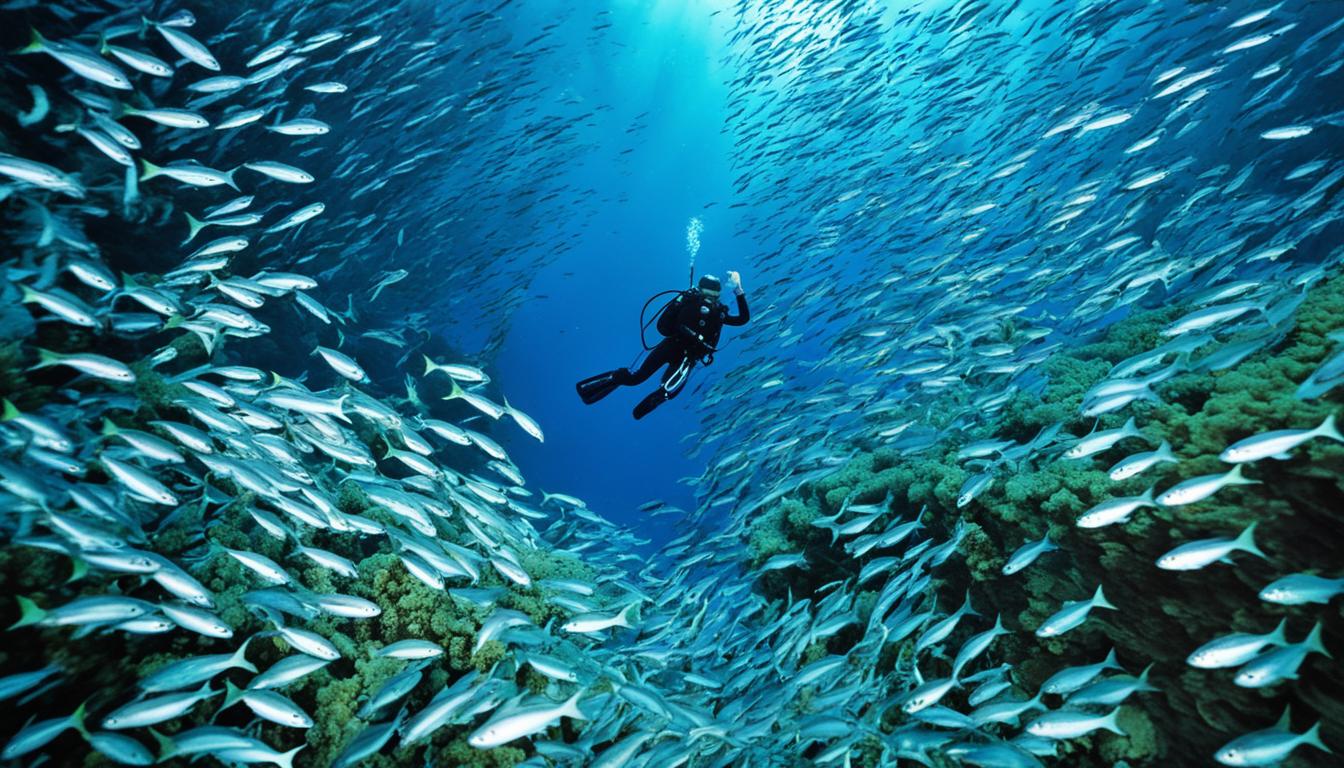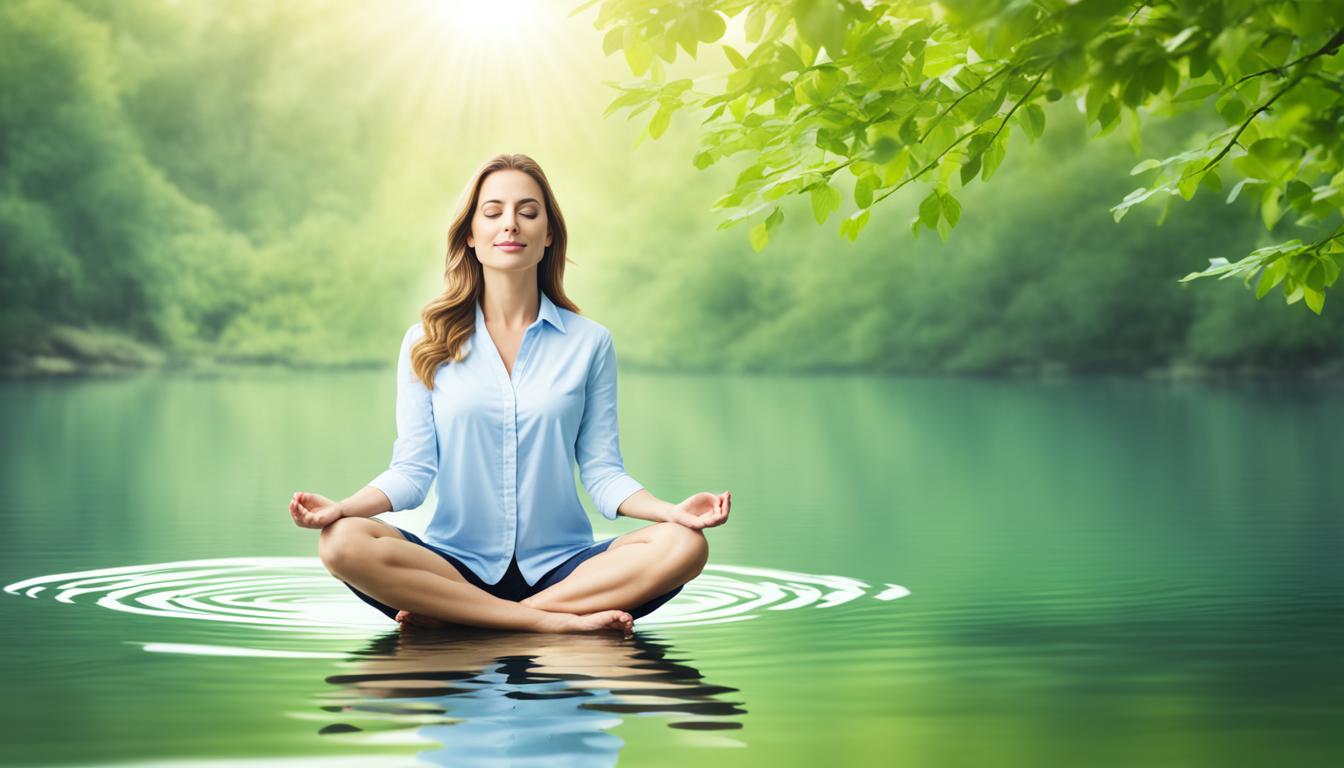Discover the transformative power of water meditation as a pathway to deep tranquility and mindfulness. Immerse yourself in the soothing qualities of water to experience a profound connection between your mind, body, and spirit. This ancient practice, rooted in civilizations like Egypt and Greece, offers a unique opportunity to surrender to the flow of water and find inner peace. Whether you choose to practice water meditation in a serene bathtub, near a tranquil lake, or by the majestic ocean, the benefits are undeniable. Let the gentle sound of water and the serenity it offers guide you on a journey of self-discovery and relaxation.
Key Takeaways:
- Water meditation is an ancient practice that promotes deep tranquility and mindfulness.
- Immersing yourself in water can have numerous physical and mental health benefits.
- Proper preparation and creating the ideal environment are crucial for a successful water meditation session.
- Explore different techniques such as floating and submerging to enhance your water meditation practice.
- Freediving combines meditation and underwater exploration for a unique experience of serenity.
Understanding the Concept of Water Meditation.
Water meditation is an ancient practice that finds its roots in civilizations such as Egypt and Greece, where water was revered for its sacred and healing qualities. This transformative practice involves immersing yourself in water to achieve harmony and balance between your mind, body, and spirit. By surrendering to the flow of water, you can experience deep emotional and spiritual healing.
In water meditation, the concept centers around the belief that water possesses transformative qualities and has the ability to bring about inner peace and tranquility. It encourages individuals to observe their thoughts and feelings without judgment, allowing them to connect with their inner selves on a profound level.
Water is not only essential for our physical well-being but also holds immense power to bring harmony and balance to our mind, body, and spirit.
The mind-body-spirit connection is an integral aspect of water meditation. The practice emphasizes the interconnectedness of these three elements and the importance of finding equilibrium among them. By immersing yourself in water and embracing its flow, you can tap into the profound connection between your thoughts, emotions, and physical sensations.
Water meditation offers a unique opportunity to explore the ancient wisdom of civilizations that recognized the healing power of water. By understanding the concept and philosophy behind this practice, you can embark on a journey of self-discovery and find deep serenity within.

The Benefits of Water Meditation.
Water meditation offers numerous benefits for both physical and mental well-being. When you immerse yourself in water, whether it’s in a bathtub, natural swimming hole, or by the calming ocean, you can experience a sense of serenity and find inner peace. Let’s explore the profound effects of water meditation on your physical and mental health.
Physical Health Benefits
Immersing yourself in water provides buoyancy, which reduces strain on your joints and muscles. This gentle support allows for a greater range of motion and promotes better circulation throughout your body. By relieving tension and pressure, water meditation can alleviate pain, improve flexibility, and enhance your overall physical well-being. It’s like giving your body a refreshing and rejuvenating break.
Moreover, water meditation offers a low-impact exercise option that is gentle on your body. The resistance provided by the water increases muscle strength and endurance without putting excessive strain on your joints and ligaments. Whether you choose to swim or simply float, the water becomes your supportive companion on your journey to improved physical health.
Mental Health Benefits
Water meditation is not just beneficial for your physical health but also for your mental well-being. The therapeutic qualities of water promote relaxation, allowing you to release stress and anxiety. As you immerse yourself in the soothing rhythm of water, you can experience a deep sense of calm and tranquility.
The gentle sound of water has an almost meditative effect, helping you quiet your mind, let go of worries, and find inner peace. It creates a serene ambiance that nurtures a peaceful state of being. The practice of water meditation can enhance your emotional well-being, reduce symptoms of anxiety and depression, and foster feelings of happiness and contentment.

Incorporating water meditation into your routine can be a powerful tool in managing stress and improving your mental health. As you connect with the calming properties of water, you create a sacred space for self-reflection, introspection, and personal growth.
Unlock the Benefits of Water Meditation
By embracing water meditation, you have the opportunity to nurture both your physical and mental well-being. Take a moment to immerse yourself in the transformative power of water, and discover the profound serenity and tranquility it can bring into your life.
Preparing for Water Meditation.
Proper preparation is crucial for a successful water meditation session. To create the ideal environment, start by choosing a peaceful and serene location. You can opt for a relaxing bath in your bathtub, find a natural swimming hole surrounded by nature’s beauty, or head to a calm and soothing ocean or lake.
Enhance the ambiance of your chosen space by incorporating essential tools that promote relaxation. Place scented candles strategically around the area to create a calming atmosphere. Play soft and soothing music in the background to set the mood for tranquility and inner peace. If you prefer, you can also use essential oils known for their calming properties to further enhance the sensory experience.
Before immersing yourself in water meditation, take a moment to prepare your mind. Begin by clearing any distracting thoughts or stress from your mind. Focus on your intention for the meditation session, whether it’s finding peace, releasing tension, or simply connecting with the soothing qualities of water. Take a few deep breaths, inhaling tranquility and exhaling any remaining tension. Allow yourself to be fully present and open to the experience that awaits you.

Techniques for Water Meditation.
Once you have prepared your mind and body for water meditation, it’s time to explore different techniques that can enhance your experience. These techniques allow you to fully immerse yourself in the soothing qualities of water and cultivate a profound sense of tranquility. Two popular techniques are the floating technique and the submerging technique.
The floating technique is a simple yet effective approach to water meditation. Find a comfortable spot in the water, whether it’s a bathtub, a serene lake, or the gentle ocean waves. Close your eyes, surrender yourself to the buoyancy of the water, and let go of any tension or stress. Allow the gentle movement of the water to carry you, feeling weightless and supported. As you float, focus on your breath and the soothing sensations of the water caressing your skin. Embrace the serenity and stillness within yourself, letting the water guide your journey to inner peace.
The submerging technique offers a deeper level of connection with the water. Start by slowly immersing yourself in the water, feeling the temperature and texture against your skin. Observe the ripples and vibrations created by your presence, acknowledging the interconnectedness of all elements. As you submerge yourself further, visualize any negative or stagnant energy leaving your body, cleansed by the purifying properties of water. Embrace the sensory experience of being fully immersed, focusing on the sound of your breath and the rhythmic flow of the water around you.
During your water meditation practice, it’s important to be aware of and overcome any challenges that may arise. Distractions, such as external noises or wandering thoughts, can interrupt your focus. Whenever you find your mind drifting, gently guide it back to the present moment by refocusing on your breath or the sensation of the water against your skin. It’s also essential to manage your expectations and progress in your practice. Remember that each meditation session is unique, and your experience may differ from one day to another. Embrace the journey and trust in the transformative power of water meditation.

Meditation with Freediving: Exploring the Depths of Tranquility.
For those seeking a truly unique meditation experience, freediving offers a captivating practice that combines the serenity of meditation with the exploration of ocean depths. Unlike traditional scuba diving, freedivers rely solely on their breath-holding abilities, diving without the aid of any scuba gear. As you descend into the depths of the ocean, a profound sense of tranquility envelopes you, enabling a deeper connection with your inner self.
Freediving allows you to leave behind the stresses and distractions of everyday life as you immerse yourself in the wonders of the underwater realm. The rhythmic movements of your body, the play of light and shadow, and the gentle currents create a mesmerizing symphony that guides you towards a state of inner peace. As you navigate through the depths, each breath becomes a conscious act, fostering mindfulness and grounding your awareness in the present moment.
One of the most remarkable aspects of freediving is the opportunity to connect with nature on an intimate level. You can encounter vibrant coral reefs, graceful marine creatures, and awe-inspiring underwater landscapes. With each dive, you become attuned to the delicate balance and interconnectedness of the marine ecosystem, gaining a profound appreciation for the beauty and fragility of our oceans.
“Freediving allows you to explore the depths of the ocean while simultaneously exploring the depths of your own being.”
Through the practice of freediving, you unlock a serene and profound inner peace. The silence of the underwater world creates a sanctuary for reflection and introspection, as you find solace in the vast expanse of the ocean. Freediving becomes a vehicle for self-discovery, allowing you to confront and release any tensions or worries held within, leaving you feeling rejuvenated and balanced.

As you resurface from each dive, you bring with you a renewed sense of clarity, presence, and gratitude. The transformative power of freediving integrates the art of meditation with the exploration of the mysterious depths, offering a truly unforgettable journey towards self-awareness and inner peace.
Conclusion.
Water meditation and freediving offer transformative practices that can lead to serenity, inner peace, and mindfulness. Whether you choose to practice in the comfort of your bathtub, the serenity of a natural swimming hole, or the vastness of the ocean, these practices allow you to connect with the soothing qualities of water and find balance between your mind, body, and spirit. By immersing yourself in the transformative power of water and embracing its flow, you can cultivate a deeper connection with yourself and the world around you.
Water meditation and freediving provide a sanctuary for your mind, body, and spirit, guiding you on a journey of self-discovery and profound serenity. The gentle sound and movement of water can transport you to a state of tranquility, helping you let go of stress and worries. As you surrender to the flow of water, you can find peace within yourself, allowing mindfulness to permeate every aspect of your life.
Embracing water meditation or exploring the depths of the ocean through freediving can be transformative practices that awaken your senses, nourish your soul, and expand your consciousness. These practices offer you the opportunity to dive deep within yourself, unlocking the serenity, inner peace, and mindfulness that reside within. So, take a moment to immerse yourself in the transformative power of water and embark on a journey of self-exploration and profound tranquility.
FAQ
What is water meditation?
Water meditation is a transformative practice that involves immersing oneself in water to achieve harmony and balance between the mind, body, and spirit. It emphasizes the connection between the soothing qualities of water and mindfulness.
What are the benefits of water meditation?
Water meditation offers numerous benefits for physical and mental well-being. It can alleviate pain, improve circulation, reduce stress and anxiety, promote relaxation, and enhance feelings of happiness and contentment.
How can I prepare for water meditation?
To prepare for water meditation, it is important to choose a peaceful and serene environment, such as a bathtub or natural swimming hole. You can also enhance the experience by using scented candles, soothing music, or essential oils. Getting into the right mindset and taking deep breaths to promote a sense of calm are also important preparation steps.
What techniques can I use for water meditation?
There are various techniques that can be used for water meditation. The floating technique involves simply floating on the surface of the water and allowing its gentle movement to carry you. The submerging technique, on the other hand, involves slowly immersing yourself in the water and observing the ripples and vibrations.
What are the challenges associated with water meditation?
Some challenges of water meditation include managing distractions and expectations, as well as monitoring progress. It is important to be aware of these challenges and approach them with patience and acceptance.
What is meditation with freediving?
Meditation with freediving combines the practices of meditation and exploring the depths of the ocean. It involves diving without scuba gear and experiencing the underwater world in a state of serenity. Freediving allows individuals to find inner peace and connect with nature.
Source Links
- https://www.metrofamilytherapy.com/article/nurturing-ones-mind-and-spirit-with-float-therapy
- https://freedivingcentral.com/blog/freediving-for-meditation-tranquil-water-for-a-tranquil-mind/
- https://www.aurahealth.io/blog/water-meditation?a7ccff4e_page=2


